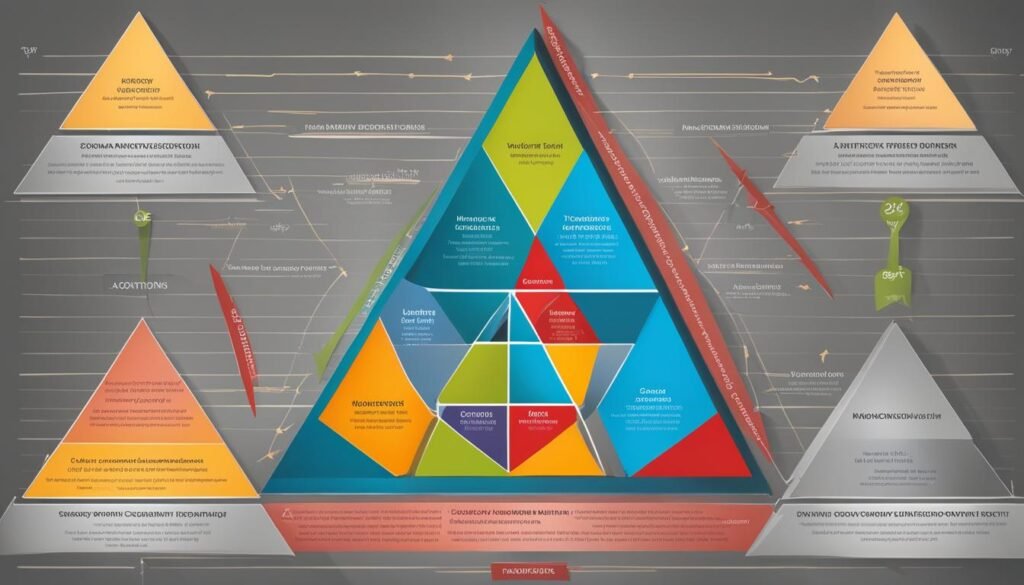Understanding the psychology behind weight loss strategies is crucial for achieving long-term success (see my post here). As an individual striving to lose weight, I recognize that my decisions about my health and lifestyle are often influenced by subconscious beliefs and motivations. By delving into the psychological factors that impact weight loss, I can gain valuable insights into my behaviors and develop effective strategies to reach my goals.
Weight loss strategies extend beyond mere diet and exercise plans. They involve a deep understanding of our mindset, emotions, and behaviors. By addressing the underlying psychological factors that influence weight loss, I can create lasting change and achieve sustainable results.
Join me as we uncover the fascinating psychology behind weight loss strategies and explore how our thinking patterns and emotions can either hinder or enhance our weight loss journey. Together, we will unlock the potential for positive transformation.
Key Takeaways:
- Understanding the psychology behind weight loss is crucial for long-term success.
- Subconscious beliefs and motivations can influence our decisions about health and lifestyle.
- Addressing psychological factors improves the effectiveness of weight loss strategies.
- Mindset, emotions, and behaviors play significant roles in achieving sustainable weight loss.
- Exploring the psychology behind weight loss can lead to positive transformation.
The Role of Perception in Weight Loss
Our perceptions about weight loss can significantly impact our ability to achieve our goals. Unconscious beliefs and perceptions may lead us to perceive more advantages than disadvantages to keeping our weight on, even if consciously we understand the negative impact on our health and self-esteem. By bringing these unconscious motives to light, we can better understand our behaviors and work towards changing our mindset to support our weight loss journey.
Perception plays a vital role in weight loss. Our mindset and belief systems can influence our behaviors, motivations, and ultimately, our ability to achieve successful and sustainable weight loss. While we may consciously understand the benefits of losing weight, our subconscious perceptions and beliefs can create roadblocks and hinder our progress. It is crucial to uncover and address these underlying perceptions to create a mindset that supports our weight loss goals.
One common perception that can impact weight loss is the belief that keeping excess weight provides more advantages than disadvantages. Even if we consciously recognize the negative impact of being overweight on our health and self-esteem, our subconscious mind may associate benefits with maintaining a higher weight. These benefits can range from providing a sense of protection or safety to avoiding certain situations or emotions.
By shining a light on these unconscious motives, we can gain insights into our behaviors and address the underlying reasons behind our weight-related choices. For example, if we realize that we associate weight gain with protection from past traumas, we can explore alternative ways to feel safe and secure without relying on overeating or maintaining a heavier body weight. This shift in mindset can open up new possibilities for sustainable weight loss.
Changing our perceptions and mindset starts with self-awareness and understanding our thought patterns and beliefs. By challenging our subconscious perceptions and replacing them with more empowering and supportive thoughts, we can create a mindset that aligns with our weight loss goals. This may involve reframing negative self-talk, focusing on the positive benefits of healthy habits, or seeking professional help, such as cognitive behavioral therapy (CBT), to address deep-seated beliefs.
In conclusion, the role of perception in weight loss cannot be underestimated. Our unconscious beliefs and perceptions can shape our behaviors and motivations, making it crucial to address and change them to create a supportive mindset for successful weight loss. By uncovering our underlying motives and adopting a mindset that aligns with our goals, we can overcome obstacles and achieve lasting results on our weight loss journey.
| Perceived Benefits of Keeping Weight On | Reality of Weight Loss Benefits |
|---|---|
| Feeling protected or secure | Improved overall health and reduced risk of chronic diseases |
| Avoiding certain situations or emotions | Increased self-confidence and improved body image |
| Belonging to a specific social group | Increased energy levels and improved physical performance |
By comparing the perceived benefits of keeping weight on with the reality of weight loss benefits, we can challenge our perceptions and make informed decisions that support our weight loss journey. It’s important to remember that changing our mindset takes time and effort, but the rewards of improved health and well-being are worth it.
Uncovering Unconscious Benefits of Weight Gain

When it comes to weight loss, understanding the psychology behind our behaviors is essential for achieving successful and long-lasting results. Many individuals unconsciously perceive benefits to keeping weight on or being overweight, which can hinder their weight loss efforts.
These unconscious benefits may include a sense of belonging, protection from past traumas, or avoidance of certain situations. For example, someone who has experienced rejection or emotional pain in the past may subconsciously believe that their weight acts as a shield, protecting them from potential harm. Similarly, individuals may feel a sense of belonging or acceptance within social circles that prioritize a larger body type.
To effectively address and overcome these challenges, it is crucial to uncover these unconscious benefits and develop alternative strategies that provide similar advantages without relying on overeating or maintaining a heavier body weight. By using behavioral strategies for weight loss, individuals can gradually shift their mindset and behaviors towards healthier choices.
By uncovering these unconscious benefits, we can develop alternative strategies to achieve the same benefits without relying on overeating or maintaining a heavier body weight.
One effective approach is to reframe the perception of what it means to be thin or fit. Instead of associating weight loss with sacrifice or exclusion, individuals can focus on the positive aspects of a healthier lifestyle, such as increased energy, improved self-confidence, and reduced risk of chronic diseases. By highlighting these benefits, individuals can create a more positive and motivating mindset towards weight loss.
In addition, incorporating techniques from cognitive behavioral therapy (CBT) can be beneficial in addressing underlying beliefs and behaviors that contribute to weight gain. CBT helps individuals identify and challenge negative thought patterns and develop healthier coping mechanisms. By addressing the psychological factors for weight loss, individuals can develop a more balanced perspective and adopt sustainable behavioral changes.
It is important to note that uncovering and addressing unconscious benefits takes time and self-reflection. It is a process that requires patience and support. By working with a qualified therapist or weight loss coach, individuals can receive guidance and encouragement throughout their journey.
Key Takeaways
- Many individuals unconsciously perceive benefits to keeping weight on or being overweight, which can hinder weight loss efforts.
- Unconscious benefits may include a sense of belonging, protection from past traumas, or avoidance of certain situations.
- Developing alternative strategies that provide similar advantages without relying on overeating or maintaining a heavier body weight is crucial.
- Reframing the perception of weight loss and incorporating techniques from cognitive behavioral therapy can help individuals overcome these challenges.
Weight Gain as a Defense Mechanism
For some individuals, weight gain can be a defense mechanism that helps them shield themselves from perceived threats or vulnerabilities. This is commonly observed in cases where weight gain follows traumatic experiences or is used as a means to avoid attention from the opposite sex.
In such situations, addressing the underlying emotional factors is crucial in order to facilitate sustainable weight loss. By developing healthier coping mechanisms and addressing the root causes of emotional eating, individuals can work towards achieving their weight loss goals without relying on unhealthy defense mechanisms.
Emotional eating often stems from an individual’s attempt to soothe negative emotions or escape from distressing thoughts. By adopting cognitive approaches to weight loss, individuals can learn to recognize and address their emotional triggers, develop healthier coping strategies, and regain control over their eating habits. This involves identifying the emotions that contribute to emotional eating, challenging negative thoughts associated with food, and finding alternative ways to deal with emotional distress.
| Cognitive Approaches to Weight Loss | Benefits |
|---|---|
| Identifying emotional triggers | Gain insight into the underlying emotions that contribute to emotional eating |
| Challenging negative thoughts associated with food | Develop a healthier mindset and establish a positive relationship with food |
| Finding alternative ways to cope with emotional distress | Discover healthier strategies to manage emotions rather than relying on food |
This cognitive approach to weight loss focuses on addressing the psychological factors that contribute to weight gain. By breaking free from the cycle of emotional eating and finding healthier coping mechanisms, individuals can achieve long-term weight loss success and improve their overall well-being (see my post here).
The Impact of Mindset on Weight Maintenance

Maintaining weight loss can be a challenging endeavor that requires more than just following a diet or exercise plan. The psychological factors involved in weight maintenance play a significant role in our ability to sustain healthy habits and prevent weight regain. By understanding the impact of mindset on our behaviors and emotions, we can develop strategies to overcome obstacles and achieve long-term success.
One of the key psychological factors for weight loss is the cultivation of a positive and resilient mindset. Negative thoughts and emotional stress can contribute to self-sabotage, making it difficult to maintain healthy habits. By adopting a positive mindset, we can better navigate the challenges of weight maintenance and develop strategies to overcome setbacks. Cultivating resilience allows us to bounce back from setbacks and stay motivated on our weight loss journey.
Mental health also plays a crucial role in weight maintenance. Our emotional well-being can directly impact our ability to maintain a healthy weight. Chronic stress and negative emotions can lead to emotional eating and a reliance on food as a coping mechanism. By prioritizing our mental health and implementing stress-management techniques, such as mindfulness or therapy, we can better manage our emotions and make healthier choices.
It’s important to address the psychological factors for weight loss, as they go hand in hand with physical changes. Developing a positive mindset and prioritizing mental health not only support weight maintenance but also improve overall well-being. By taking a holistic approach to weight loss that encompasses both physical and mental aspects, we can achieve sustainable, long-term success.
| Psychological Factors for Weight Loss | Mental Health and Weight Loss |
|---|---|
| Positive mindset | Emotional well-being |
| Resilience | Stress management |
| Motivation | Emotional eating |
“The key to successful weight maintenance lies not only in physical changes but also in nurturing a positive mindset and prioritizing mental well-being.”
Strategies for Cultivating a Positive Mindset:
- Practice daily affirmations to reinforce positive beliefs about yourself and your weight loss journey.
- Surround yourself with a supportive network of friends and family who understand and encourage your goals.
- Set realistic goals and celebrate small achievements along the way to stay motivated.
- Engage in activities that bring joy and reduce stress, such as hobbies, meditation, or spending time in nature.
Managing Emotional Well-being:
- Seek professional help if needed, such as therapy or counseling, to address underlying emotional issues.
- Practice stress-management techniques, such as deep breathing exercises or journaling, to reduce emotional eating triggers.
- Engage in regular physical activity, which releases endorphins and promotes positive emotions.
- Make self-care a priority, including getting enough sleep, eating nutritious meals, and engaging in activities that bring you joy.
By incorporating these strategies into your weight maintenance routine, you can create a positive and supportive mindset that promotes long-term success. Remember, weight loss is not just about physical changes; it’s about nourishing your mind and body for overall well-being.
The Power of Cognitive Behavioral Therapy (CBT) in Weight Loss

Cognitive Behavioral Therapy (CBT) has proven to be a powerful tool in weight loss strategies, targeting the psychological aspects that contribute to weight gain. By addressing thoughts, emotions, and behaviors, CBT enables individuals to develop healthier habits and mindset, leading to sustainable weight loss outcomes.
Studies have shown that incorporating CBT techniques into weight loss programs can result in significant weight loss. The psychology behind these strategies involves identifying and challenging negative thought patterns, fostering positive self-talk, and cultivating a mindset that supports healthy behaviors.
When it comes to weight loss, behavioral strategies play a vital role. CBT helps individuals understand the underlying reasons behind their eating habits, such as emotional eating or unhealthy coping mechanisms. By delving into the psychological factors, CBT empowers individuals to make conscious, informed choices that align with their weight loss goals.
By addressing the thoughts, emotions, and behaviors that contribute to weight gain, CBT helps individuals develop healthier habits and mindset.
Incorporating CBT into weight loss strategies provides individuals with the tools to manage cravings, overcome obstacles, and maintain their progress long-term. By reshaping thought patterns and embracing healthier behaviors, individuals can create lasting change in their relationship with food and their bodies.
CBT techniques can be implemented through several approaches, such as cognitive restructuring, where individuals challenge negative thoughts and replace them with more positive and realistic ones. Additionally, individuals can practice behavioral activation, engaging in rewarding and fulfilling activities that promote a healthy lifestyle.
Benefits of Cognitive Behavioral Therapy in Weight Loss:
- Enhances self-awareness: CBT enables individuals to identify triggers and emotional patterns associated with unhealthy eating behaviors, helping them make conscious choices.
- Develops coping mechanisms: CBT equips individuals with effective strategies to deal with stress, emotional eating, and other challenges that may hinder weight loss progress.
- Promotes realistic goal setting: Through CBT, individuals can set achievable goals, leading to a sense of accomplishment and motivation to continue their weight loss journey.
- Improves self-esteem and body image: By focusing on positive self-talk and challenging negative beliefs, CBT helps individuals cultivate a more positive body image and strengthen their self-worth.
Cognitive Behavioral Therapy has proven to be a valuable asset in the psychology behind weight loss strategies. By addressing the psychological barriers to weight loss and instilling healthier habits and mindset, individuals can experience successful and sustainable weight loss outcomes.
Overcoming Procrastination and Negative Self-Talk

When it comes to achieving weight loss goals, procrastination and negative self-talk can be significant obstacles. Unhelpful thought patterns and beliefs can lead to self-sabotaging behaviors and a lack of motivation. To overcome these challenges, it’s important to address and challenge negative self-talk, reframing our thoughts to support a positive mindset that propels us towards success in our weight loss journey.
Procrastination often stems from underlying fears or uncertainties. We may fear failure, judgment, or even success, which can lead to putting off taking action towards our weight loss goals. By recognizing these fears and addressing them head-on, we can break free from the cycle of procrastination and move forward with confidence.
One effective strategy is to identify and challenge negative self-talk. Negative thoughts, such as “I’ll never lose weight” or “I always mess up,” can create a self-fulfilling prophecy and undermine our confidence. By consciously reframing these negative thoughts into positive and motivating statements, we can build a resilient mindset that supports our weight loss journey.
“I am capable of achieving my weight loss goals. Every small step I take brings me closer to success.”
Additionally, surrounding ourselves with positive influences and a supportive community can make a significant difference. Sharing our goals, progress, and challenges with others who understand and are on a similar journey can provide invaluable encouragement and accountability.
By overcoming procrastination and negative self-talk, we can cultivate the right mindset for successful weight loss. With determination, perseverance, and a positive mindset, we can achieve our weight loss goals and create lasting changes in our health and well-being.
Key takeaways:
- Procrastination and negative self-talk can hinder weight loss progress.
- Identify and challenge negative self-talk to reframe thoughts and overcome self-sabotage.
- Address underlying fears and uncertainties that contribute to procrastination.
- Surround yourself with a supportive community to stay motivated and accountable.
- Cultivate a positive mindset that supports your weight loss journey.
The Link Between Mindset and Physical Health

Our mental well-being plays a significant role in our physical health and weight loss journey. When we have unresolved emotional issues and experience chronic stress, it can lead to hormonal imbalances and physical symptoms that hinder our efforts to lose weight.
Addressing the mind-body connection and prioritizing mental health is crucial for enhancing overall well-being and improving the chances of successful weight loss.
By taking steps to improve our mental health, we can create a supportive environment for weight loss and optimize our overall health. This can include seeking therapy or counseling, practicing stress-reducing techniques such as meditation or yoga, and cultivating positive self-care habits.
Additionally, building resilience and adopting a positive mindset can help us navigate the challenges of weight loss with more ease and motivation.
When we prioritize mental health alongside physical health, we create a solid foundation for sustainable weight loss and long-term well-being.
The Impact of Stress on Weight Loss
Stress is a common factor that can significantly affect our ability to lose weight. When we are under stress, our body releases cortisol, a hormone that can increase appetite and cravings for high-calorie foods.
This can lead to emotional eating and make it more challenging to adhere to a healthy eating plan. Additionally, stress can disrupt sleep patterns, which can further disrupt hormone balance and affect weight regulation.
By managing stress through techniques such as exercise, relaxation exercises, and engaging in activities we enjoy, we can better support our weight loss goals.
The Role of Self-Care in Weight Loss
Practicing self-care is essential for supporting both our mental and physical well-being during weight loss. Self-care activities can include getting enough sleep, nourishing our bodies with nutritious foods, engaging in regular physical activity, and taking time for hobbies and activities that bring us joy and fulfillment.
By prioritizing self-care, we can reduce stress levels, improve emotional well-being, and establish healthy habits that contribute to successful weight loss.
Quote:
“Taking care of your mental health is just as important as taking care of your physical health. By addressing both, you create the foundation for long-term weight loss success and overall well-being.” – Dr. Emily Roberts, Psychologist
| Benefits of Addressing Mental Health in Weight Loss | Benefits of Physical Health in Weight Loss |
|---|---|
| Reduces emotional eating | Improves cardiovascular health |
| Increases motivation and adherence to weight loss strategies | Enhances immune system function |
| Improves self-esteem and body image | Increases energy levels |
| Reduces stress levels | Supports healthy hormone balance |
Addressing mental health alongside physical health is essential for optimizing weight loss outcomes and overall well-being. By prioritizing both aspects, individuals can create a synergistic approach to achieve long-term success in their weight loss journey.
Changing Behaviors through Mindset Shift

A mindset shift is crucial for achieving long-term weight loss and sustainable behavior change. By identifying and challenging our limiting beliefs, we can develop healthier habits and make lasting changes to our behaviors. It’s important to understand that weight loss is not just about counting calories or following a strict diet. It’s about transforming our mindset and creating a healthy relationship with food and our bodies.
When we shift our mindset, we can approach weight loss from a place of self-compassion and positivity. Instead of viewing it as a punishment or a short-term goal, we embrace it as a lifestyle change that will improve our overall well-being.
To facilitate this mindset shift, it’s crucial to develop practical strategies that support our weight loss goals. This can include meal planning, regular exercise, and finding activities that bring us joy and fulfillment. By incorporating these strategies into our daily lives, we can optimize our weight loss outcomes and build a sustainable foundation for long-term success.
The Power of Mindfulness
One powerful strategy for behavior change is practicing mindfulness. Mindfulness involves being fully present in the moment and non-judgmentally observing our thoughts, emotions, and bodily sensations. It helps us become more attuned to our body’s hunger and fullness cues, allowing us to make informed choices about our food intake.
Research has shown that incorporating mindfulness into our eating habits can lead to improved portion control and reduced emotional eating. By taking the time to savor and appreciate our meals, we can develop a healthier relationship with food and make choices that align with our weight loss goals.
| Benefits of Mindfulness in Weight Loss | Strategies for Incorporating Mindfulness |
|---|---|
| Improved portion control | Engage all your senses while eating, noticing the flavors, textures, and smells of your food. |
| Reduced emotional eating | Practice mindful breathing before meals to center yourself and focus on your body’s cues. |
| Increased self-awareness | Keep a food journal to track your eating patterns and emotions associated with eating. |
| Enhanced body acceptance | Engage in daily body scan meditations to cultivate self-compassion and acceptance. |
By incorporating mindfulness into our weight loss journey, we can develop a more positive and intuitive approach to eating. It allows us to make conscious choices that nourish our bodies and support our long-term goals. Remember, weight loss is not just about the number on the scale; it’s about finding balance and cultivating a healthy lifestyle.
In addition to mindfulness, it’s important to seek support and guidance throughout the weight loss process. Working with a qualified healthcare professional or joining a support group can provide valuable insights, accountability, and encouragement.
Remember, changing our behaviors and mindset takes time and effort. It’s a journey that requires patience and perseverance. But by making small, consistent changes and embracing a positive mindset, we can achieve our weight loss goals and improve our overall well-being.
The Role of Cognitive Triangle in Weight Loss

The cognitive triangle, which highlights the connection between thoughts, feelings, and behaviors, is a fundamental aspect of weight loss. Our thoughts shape our emotions, which, in turn, influence our actions. By understanding and addressing the cognitive triangle, we can develop a healthier mindset and make choices that align with our weight loss goals.
The cognitive triangle consists of three interconnected components:
- Thoughts: Our thoughts play a crucial role in determining our emotions and behaviors. Negative or self-defeating thoughts can create barriers to weight loss, leading to a lack of motivation or unhealthy behavioral patterns. By challenging and replacing these negative thoughts with positive and empowering ones, we can cultivate a mindset that supports our weight loss journey.
- Feelings: Our emotions are closely tied to our thoughts and can greatly influence our behaviors. Stress, anxiety, or low self-esteem can trigger emotional eating or sabotage our weight loss efforts. By learning to manage our emotions effectively through stress-reduction techniques, self-care, and seeking support when needed, we can prevent emotional obstacles from derailing our progress.
- Behaviors: Our actions are a direct result of our thoughts and feelings. By aligning our behaviors with our weight loss goals, such as engaging in regular physical activity, following a balanced diet, and practicing mindful eating, we can create positive habits that support sustainable weight loss.
Addressing the cognitive triangle requires self-awareness, introspection, and the willingness to challenge and change our thoughts, emotions, and behaviors. It may be beneficial to seek guidance from a qualified therapist or weight loss coach who can provide cognitive-behavioral strategies tailored to individual needs.
Remember, the cognitive triangle is not a linear process, but rather an ongoing cycle. Each component influences and interacts with the others, creating a complex interplay that shapes our weight loss journey.
“By understanding and addressing the cognitive triangle, individuals can develop a healthier mindset and make choices that align with their weight loss goals.”
Cognitive Triangle Example:
| Component | Example |
|---|---|
| Thoughts | “I’ll never be able to lose weight. I’ve failed before, so why bother trying again?” |
| Feelings | Hopelessness, self-doubt, and frustration |
| Behaviors | Emotional eating, lack of motivation to exercise, giving up on weight loss goals |
As depicted in the example above, negative thoughts can lead to discouraging emotions and self-defeating behaviors that hinder weight loss progress. By challenging these negative thoughts and replacing them with positive affirmations, individuals can shift their emotions and behaviors towards more constructive patterns that support successful weight loss.
What Psychological Strategies Can Help with Coping with Weight Loss Setbacks?
Coping with weight loss setbacks can be tough, but psychological strategies can help. Practice self-compassion and remind yourself that setbacks are normal. Focus on small, achievable goals and celebrate your progress. Seek support from friends, family, or a therapist to stay motivated and resilient on your weight loss journey.
BetterMe: A CBT-Powered Program for Weight Loss

BetterMe offers a comprehensive program that combines cognitive behavioral therapy (CBT) principles with practical lifestyle changes. This CBT-powered program is designed to help individuals uncover and overcome the mental obstacles that often hinder weight loss success.
Through a personalized approach, BetterMe provides mindset-shifting tools, workout plans, and meal plans tailored to individual preferences. By addressing the psychological factors that influence weight loss, BetterMe empowers individuals to make lasting behavior changes that promote sustainable weight loss.
One of the key features of BetterMe’s program is its use of CBT techniques. CBT helps individuals identify and challenge negative thought patterns and beliefs that can sabotage weight loss efforts. By understanding the connection between thoughts, feelings, and behaviors, individuals can develop healthier habits and attitudes towards food, exercise, and self-image.
In addition to CBT, BetterMe also offers ongoing support and guidance to individuals throughout their weight loss journey. This support is crucial in maintaining motivation, accountability, and ensuring long-term success.
Key Features of BetterMe
- Customized meal plans based on individual preferences and goals
- Workout plans designed to maximize weight loss and improve overall fitness
- Mindset-shifting tools to challenge negative thought patterns and develop a positive relationship with food and exercise
- Ongoing support from a dedicated community and expert coaches
With BetterMe, individuals can access a comprehensive and evidence-based weight loss program that takes into account the psychological factors that influence behavior change. By addressing the underlying mindset and providing practical tools and support, BetterMe helps individuals achieve their weight loss goals and maintain a healthier lifestyle in the long run.
Conclusion
The psychology behind weight loss strategies is a vital component in achieving and maintaining a healthy weight. By delving into the underlying motivations, beliefs, and emotions that drive our behaviors, we can devise effective strategies to overcome obstacles and achieve long-lasting weight loss (check out my post on lasting weight loss here). It is essential to recognize that weight loss is not solely a physical journey but also a psychological one.
A mindset shift plays a crucial role in changing behaviors and achieving sustainable weight loss. By challenging limiting beliefs and embracing a positive mindset, individuals can cultivate healthier habits and make choices that support their weight loss goals. However, implementing behavioral changes alone may not be enough; support and guidance are also key factors for success.
Mental health is equally important in the weight loss journey. Addressing emotional well-being, resolving past traumas, and managing stress can greatly impact overall health and weight loss efforts. Programs like BetterMe, which combines cognitive behavioral therapy principles with practical lifestyle changes, provide the necessary tools, support, and expertise to help individuals unlock their full potential for lasting positive change.
By understanding the psychology behind weight loss strategies and prioritizing mental health, individuals can make informed choices and develop personalized strategies that lead to successful and sustainable weight loss. Remember, achieving a healthy weight is not just about physical transformation but also about embracing a holistic approach that encompasses both the mind and body.




